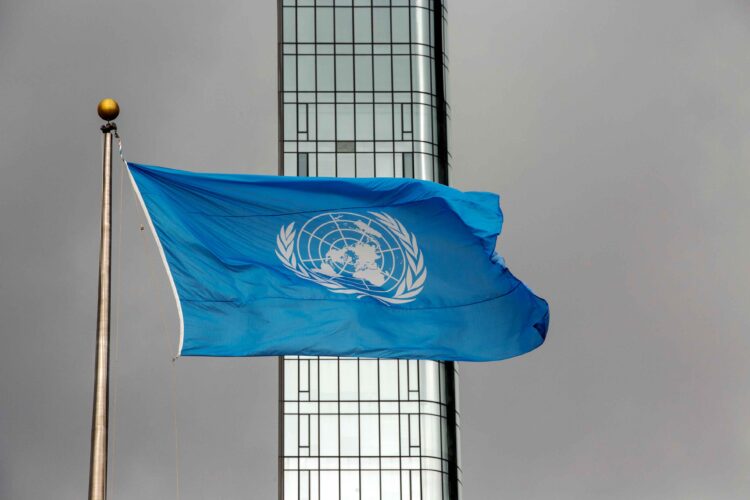A clip of a United Nations (UN) spokesperson announcing the creation of a worldwide anti-misinformation censorship crusade against independent social media users and dissenting governments caught attention on Thursday. The video is actually from May, but it went underreported at the time and only recently resurfaced.
Melissa Fleming, the Under-Secretary-General for Global Communications at the UN, made the announcement in a speech called “Healing our troubled information ecosystem.” The speech was held in Washington, D.C. at the May 2023 Nobel Prize Summit hosted in partnership with the National Academy of Sciences (NAS).
Learn the benefits of becoming a Valuetainment Member and subscribe today!
She made the announcement toward the end of the speech:
We feel like we are in an information war, and that we need to massively ramp up our response. So we’re creating at the UN a central capacity to monitor and also have the ability to rapidly react when mis- and disinformation and hate speech is threatening not just our people and our operations but also the issues and the causes we are working on. But also we’re going to be gearing up our verified initiative around climate change and developing this UN Code of Conduct on information integrity on digital platforms hoping to set global standards that we can all advocate around so that we can collectively work for a more humane internet.
The UN Declares 'War' Against Covid and Climate Change 'Misinformation'
"We are in an information war… we need to massively ramp up our response."
The UN's Under-Secretary-General for Global Communications Melissa Flemings blamed Twitter/X for the spread of dangerous… pic.twitter.com/5kCzURvY5G
— Kyle Becker (@kylenabecker) September 14, 2023
NEW – UN's Under-Secretary-General for Global Communications wants to "massively ramp up" an "information war" on "disinformation" with an "army of trusted messengers."pic.twitter.com/1dFWl1NsML
— Disclose.tv (@disclosetv) September 14, 2023
She then addressed the audience, full of publicists, science communicators, and other media professionals, asking for their help:
We obviously can’t do this alone, and it is so inspiring to have all of you here in the room who are working in so many different ways to create a more humane information ecosystem. I think that we vastly outnumber the haters altogether, right? And if we do join forces, I think we can also together heal our troubled information ecosystem.
Fleming had scorn for social media platforms, whom she described as insufficiently complying with UN demands for algorithmic promotion and censorship advising. “The UN is working on multiple fronts to bring more balance into our information ecosystems. By stepping up our online communications and in many ways we’re trying to make UN content “cool,”” she laughed with a sigh.
But just to note, we do face lots of challenges. Certain social media policies hamper our reach. Meta, for example, has acknowledged that the UN falls under a category called “civic downranking,” which actually puts us at an algorithmic disadvantaged at a starting point. And of course firings at Twitter has left us with no one to call to flag content that is abusive or even incitement to violence. We’re now seeing that almost anyone can promote disinformation for the price of a blue tick.
“It’s not all bad,” she reassured her audience. There are good things on the horizon, such as brigades of censorious hall monitors who will flag any content that disagrees with current narratives on COVID and climate change:
We have teamed up with the platforms to elevate reliable information around COVID and climate, to amplify trusted messengers—and we have quite an army out there who want to take UN content and promote it within their followings. And also educating users on how to slow the spread of disinformation. Our new slogan we want everybody to have in their ear is “Pause, Take Care Before You Share.”
She began her ten minute speech by stating she was made aware of the “dark side” of social media during the 2015 European refugee crisis, when “bad actors started spreading ugly lies online to frighten the public.” She then pivoted to online homeopathic communities, criticizing them for “trying to convince people from receiving life-saving vaccines.” The UN, according to Fleming, decided it needed to do something about the “problem” posed by online social media users when they went to African countries during the COVID-19 pandemic and people refused their vaccines. She also claimed that social media has been used to start genocides around the world and push anti-Semitic “hate speech.” “And even the UN is under attack,” she exclaimed, “false allegations spread online are targeting UN peacekeepers.”
Fleming commended AI technologists for begging for regulations, and underscored the importance of establishing intergovernmental legal frameworks to control AI use and development led by the UN.
She returned multiple times to the topic of climate change and stressed the importance of censoring those who disagree with their predictions:
As we’ve heard from many other speakers, social media is also being harnessed to undermine and distort and abuse those who are promoting the science around climate change. The goal? To silence the scientists and the activists and secure a livable a future for the planet. I’m seeing a number of news reports in the last couple of days and surveys citing climate scientists who are fleeing Twitter in droves. This is sad, because we need those voices.


















Add comment